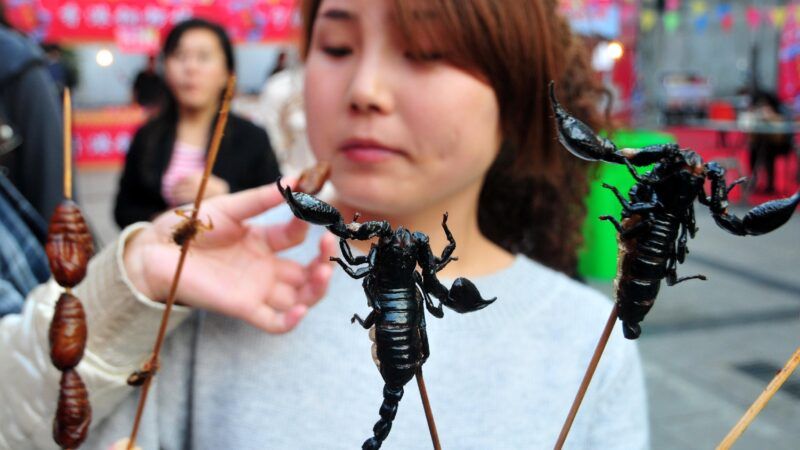Some Food Regulators Fret Needlessly Over Eating Bugs
Cicada season reminds us that insects are a great food source for humans.

This month, as much of the East Coast of the United States is inundated by the once-every-17-year spectacle of cicadas known as Brood X, some people are trying to figure out how to get rid of them. Experts say such efforts are futile.
But others, Old Bay seasoning in hand, are fighting the good fight. They're frying up batches of cicadas and eating them like French fries.
Spurred no doubt by the buzz around cicada dishes, the Food and Drug Administration (FDA) this week cautioned that people should not eat cicadas if they are allergic to seafood because, the agency notes, cicadas are related to shellfish—a known allergen—such as lobsters. (Notably, this was the agency's second cicada-related warning in a week.)
While one Twitter commenter joked about the FDA's warning to people with a "tree shrimp allergy," another commenter—me, actually—pushed back against the FDA warning in a lengthy thread. Though the FDA got its warning wrong—TLDR: not all seafood is shellfish—the agency generally isn't an enemy to those who would eat insects.
Sure, traditionally, regulatory bodies such as the FDA have viewed insects not as food but, rather, as pests and adulterants. As I detailed in a 2018 column on regulatory threats to the otherwise bright future of insects as food, agency rules known as the "Food Defect Action Levels" identify and permit certain quantities and types of insects to be present in some foods. For example, I noted that the frozen orange juice you buy at your local grocer may legally contain some fruit flies, fly eggs, or maggots.
Though the FDA's Food Defect Action Levels treat those bugs as unwanted and illicit surprises, rules in the United States are generally quite good for those who sell bugs intentionally as food.
That's not true everywhere. Last month, a company that wants to market dried yellow mealworms became just the first in the European Union to obtain approval for insects-as-food under the E.U.'s "novel" food regulations.
While the approval is a welcome development, classifying bugs as a "novel" food places a tremendous burden on those who would market them. The E.U. isn't alone. As The Guardian reported last week, "the U.K.'s fledgling edible insect sector" is under threat thanks to changes in the way the British government will regulate insects as food in the wake of Brexit.
That's because the E.U. has in place "transitional" rules for approving and regulating what it considers "novel" foods, and the U.K. does not. That, plus some regulatory intransigence in the U.K., leaves purveyors of edible insects (and products made with them) stuck in limbo.
None of this makes sense. First and foremost, insects are a perfect example of a food that isn't "novel" at all.
"People have evolved eating insects: they are part of our biological and cultural history; to classify them as 'novel' is inconsistent," Tilly Collins, a senior fellow with the Centre for Environmental Policy at Imperial College London, told The Guardian. "It will prevent us from benefiting from this environmentally superior form of meat."
"The use of insects as an alternate source of protein is not new, and insects are regularly eaten in many parts of the world," E.U. regulators declared while, again, still classifying insects as "novel" foods.
Wherever you stand on eating insects, some Western regulators' trepidations over edible bugs likely amuse the rest of the world. For example, grasshoppers are a common food in parts of Indonesia. The practice of raising insects for food is increasingly common across the globe. And, despite public perception, insects are also a longstanding part of the American diet. Native Americans have eaten bugs for countless generations. While in college in Washington, D.C., I sometimes snacked on bugs (as bar snacks) and, more recently, chowed down on some tasty chili-lime grasshoppers—known as chapulines in Mexico—that I bought at a Seattle Mariners game.
There are great reasons to eat bugs: they are inexpensive, environmentally sustainable, tasty, and a great source of protein, fat, and fiber.
Earlier this year, while noting those benefits and more, the United Nations Food & Agriculture Organization (FAO) issued a report on food safety and edible insects. As the report details, insects may carry many of the same risks found in other foods—including germs and other contaminants. The FAO, while urging more research into food safety, recommends countries adopt clear rules that facilitate the marketing of insects as food.
As the FAO report also makes clear, edible insects are regulated far more stringently in countries and regions where they are not traditionally consumed than in those where they are consumed regularly. The fact edible insects are not tightly regulated in countries where they're popular suggests bugs are safe to eat without being subject to a host of regulations, and that regulations in bug-phobic countries may be dampening their popularity artificially without providing any food-safety benefits. That's a shame.
As is so often the case, regulations—in this case, mostly those in the U.K. and E.U.—stifle the adoption of new and traditional food choices alike. Governments should regulate insects lightly, and treat them as they would any other food.


Show Comments (91)